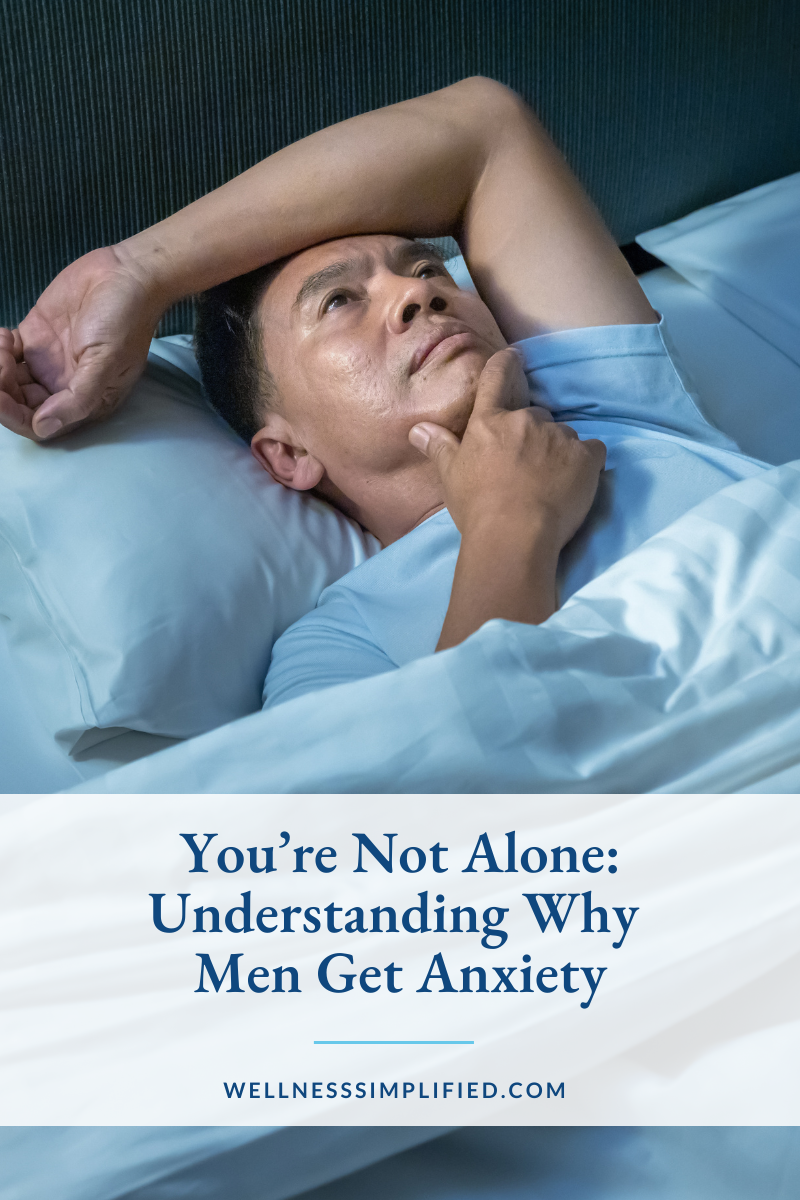Anxiety is a mental health issue that affects millions of people worldwide, and men are no exception. Yet, the way men experience and deal with anxiety can differ significantly from women.
Rest assured that anxiety in men is very common and there are tools to help support you on your mental health journey.
Traditionally, society has placed expectations on men to be strong, stoic, and emotionally resilient. These stereotypes can make it difficult for men to acknowledge and seek help for mental health issues like anxiety. This expectation often leads to underreporting, meaning that anxiety in men might be more common than statistics suggest.

Commons Reasons Men Suffer From Anxiety
Societal Expectations: From a young age, boys are often encouraged to suppress their emotions and "toughen up." As adults, men may feel pressured to meet societal expectations of masculinity, leading to internalized stress and anxiety.
Career and Work: Many men feel immense pressure to succeed professionally, often tying their self-worth to their career achievements. The fear of failure or not meeting expectations can contribute significantly to anxiety.
Financial Stress: Men often feel a strong sense of responsibility for providing financially for their families. Economic instability, job loss, or financial insecurity can trigger anxiety, especially when men perceive these situations as personal failures.
Relationship Struggles: Just like women, men face relationship challenges that can cause anxiety. Whether it's issues with a partner, family dynamics, or social isolation, these problems can take a toll on mental health.
Health Concerns: Men might be less likely to visit the doctor for routine checkups, leading to untreated health issues that can cause or exacerbate anxiety. The fear of illness or the impact of chronic conditions can also be significant stressors.
How Common Is Anxiety Among Men?
Anxiety is more common among men than many realize. According to the National Institute of Mental Health (NIMH), approximately 19.1% of U.S. adults experience an anxiety disorder each year, with men accounting for a substantial portion of these cases. However, studies suggest that the true prevalence may be higher, as many men may not seek help due to stigma or a belief that they should handle the problem on their own.
Interestingly, while women are statistically more likely to be diagnosed with anxiety disorders, men are more likely to turn to unhealthy coping mechanisms like substance abuse, aggression, or workaholism, further complicating the issue. These behaviors often mask the underlying anxiety, making it harder to identify and treat.
How to Help Men’s Anxiety
The first step in addressing men's anxiety is to normalize the conversation around mental health. Encouraging men to talk openly about their feelings and seek help without judgment is crucial. Here are some steps that can be taken:
Education: Educating men about the signs and symptoms of anxiety can help them recognize the issue early and seek appropriate help.
Learning Healthy Coping Mechanisms: Learning to adopt healthy coping strategies, such as exercise, mindfulness, and therapy, can reduce anxiety's impact.
Forgetting Stereotypes: Masculinity doesn’t mean being mentally “tough.” It can mean unapologetically taking care of your body and brain and being proud instead of embarrassed to seek help.
Mental Health Services: Finding a therapist who specializes in helping men with anxiety is a key step to learning how to healthily deal with anxiety. If you’re looking for an anxiety therapist in Utah or North Dakota schedule a free 15-minute introduction call here.
Anxiety is a common and serious issue that affects men across all walks of life. By understanding the unique challenges men face and working to break down the barriers that prevent them from seeking help, we can create a more supportive environment that fosters mental well-being for everyone.
If you or someone you know is struggling with anxiety, remember that help is available, and taking that first step toward seeking support signals strength, not weakness.

Aaron Benson, LCSW
Aaron has almost two decades' worth of experience helping people with different mental health issues including being a substance abuse counselor, health coach, and clinician. He specializes in helping men with anxiety, depression, grief, confidence, and anger issues. Aaron received a Bachelor of Sciences degree from Brigham Young University as well as a Masters of Social Work Degree from Eastern Washington University. His speciality is helping men in Utah and North Dakota through online therapy services.

Comments